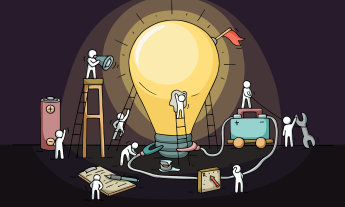“Economic development is of the people, by the people and for the people,” declared entrepreneur and economist Iqbal Quadir on the TED stage back in 2005. In his talk, he offered a bold vision for bottom-up development and shared a searing critique of foreign aid — that it actually does more harm than good. His own story of innovation in his native Bangladesh illustrated his vision for grassroots development: Grameenphone is a network of mobile phones for Bangladesh’s poor that increases productivity by increasing connectivity.
Eight years later, Quadir is still thinking deeply about development in the world’s poorest countries. Grameenphone has grown to become the largest phone provider in Bangladesh. And Quadir, now a professor at MIT, has turned his attention to training the next generation of grassroots entrepreneurs.
At the Legatum Center for Development and Entrepreneurship at MIT, which he founded in 2007, Quadir teaches bottom-up development to aspiring entrepreneurs looking to invent and distribute productive technologies in developing countries. “I’m trying to teach them how to create real businesses that will help mainstream folks, businesses that will be sustainable in serving ordinary people. I’m trying to teach other people how to do what I did,” he said in a recent conversation with TED.
The Center is founded on the core idea of Quadir’s talk: Bottom-up innovation is the best recipe for economic growth and good government in developing nations. It’s an idea that Quadir believes “now more than ever,” as he’s researched and written more deeply on the topic in the past eight years.
Legatum’s curriculum breaks from the tired script of government reform, aid and intervention and instead focuses on fostering economic dynamism in low-income countries. Quadir sees Grameenphone as just one of thousands of possible tools to enhance productivity in the developing world — efficient agriculture, medical tourism, sanitation solutions and textbook access programs, for example, are also important innovations that all stand to improve economic growth.
Quadir’s hope is that each of his center’s fellows will create and distribute an innovation of their own — and many of them are doing just that. During his time at the Center, former fellow Javier Lozano developed a business designed to address diabetes in Mexico, a country with 10 million people navigating life with the disease. Clínicas del Azúcar is a chain of low-cost diabetes clinics that make care accessible to Mexico’s underserved. A current fellow, Sarah Dimson, has plans for a real-estate development company in Tanzania that would produce affordable housing with renewable energy. Quadir thinks the successes of the Center’s fellows and their businesses suggest that bottom-up development is proving itself more and more feasible.
While Quadir’s focus is currently on inspiring innovation in the next generation, he’s involved in two projects of his own as well. This past spring, Quadir and his brother, Kamal, founded a money-transfer system designed to serve Bangladesh’s rural poor. bKash transfers money through mobile phones, a device that has become increasingly ubiquitous in Bangladesh’s rural areas thanks to Grameenphone. Quadir is also working to bring energy to the Bangladeshi countryside with Emergence BioEnergy, which he launched in 2008. The company is in the process of designing a system of de-centralized energy production in the world’s rural areas, which would allow people living off the energy grid to produce their own energy using fuel already available to them.
Finally, this busy speaker also has a book in the works, which will blend his personal narrative of growing up in Bangladesh and moving to the United States with serious thinking on the nature of progress.
Elizabeth Jacobs is an editorial freelancer at TED.












